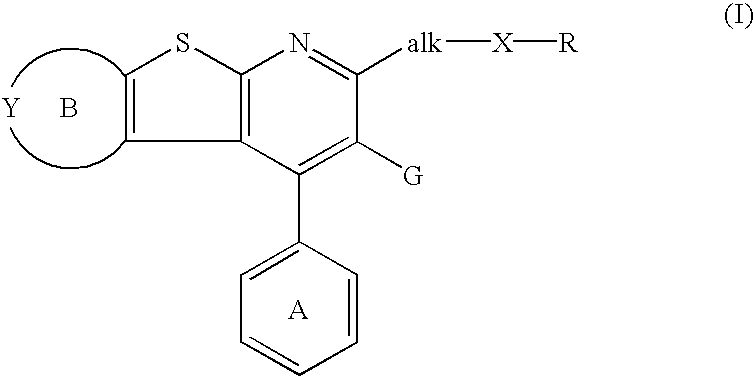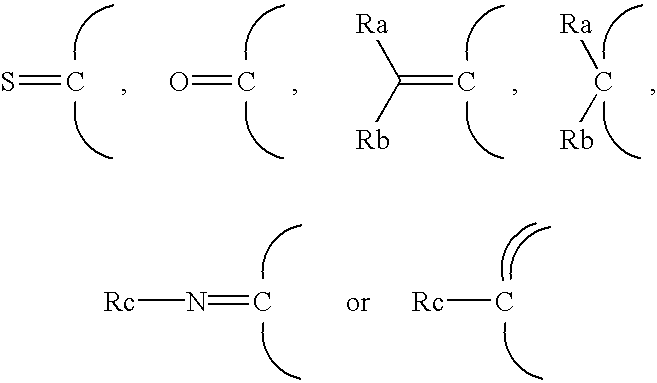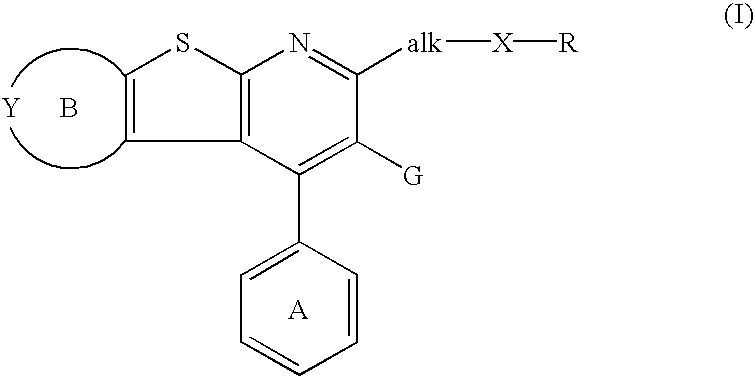Thienopyridine derivatives, their production and use
a technology of thienopyridine and derivatives, applied in the field of thienopyridine derivatives, can solve the problems of adverse reactions, insufficient efficacy, and serious disability
- Summary
- Abstract
- Description
- Claims
- Application Information
AI Technical Summary
Benefits of technology
Problems solved by technology
Method used
Image
Examples
reference example 1
A mixture of 4-oxothiane (2.0 g), 4-methoxybenzoylactonitrile (described in PCT International Application Publication No. WO99 / 65916) (3.0 g), sulfur (577 mg), morpholine (1.6 g) and ethanol (120 ml) was heated under reflux with stirring for 3 hours and then the solvent was evaporated under reduced pressure. To the residue was added ethyl acetate and the resulting solution was washed with 1 N hydrochloric acid and water, dried (MgSO.sub.4), and then evaporated under reduced pressure to remove the solvent. The residue was subjected to column chromatography on silica gel, and 2-amino-4,5-dihydro-3-(4-methoxybenzoyl)-7H-thieno[2,3-c]thiopyran (3.6 g, 69%) was obtained from the eluates with ethyl acetate-hexane (3:1) It was recrystallized from THF-hexane. Colorless prisms. Melting point of 178-179.degree. C.
According to the same manner, compounds in Reference Examples 2 to 9 described in Table 2 were synthesized.
reference example 10
According to the process described in Tetrahedron, 47, 1991, 3259, a solution of sodium amide (18.5 g) in THF (100 ml) was added to a solution of 1,4-cyclohexanedione monoethylene ketal (18.5 g) in THF (100 ml) under a nitrogen atmosphere while keeping the temperature of the solution at 10-20.degree. C. After stirring at 20.degree. C. for 30 minutes, methyl iodide (41.3 g) was added and the stirring was continued at room temperature for 1 hour. The reaction solution was mixed with a saturated aqueous solution of ammonium chloride (100 ml) and extracted with diethyl ether. The diethyl ether layer was washed with water, dried (MgSO.sub.4), and then evaporated under reduced pressure to remove the solvent. The residue was subjected to column chromatography on silica gel and an oily mixture (mixture ratio of 1:1, 15.1 g) of 4,4-ethylenedioxy-2-methyl-1-cyclohexanone and 4,4-ethylenedioxy-2,2-dimethyl-1-cyclohexanone was obtained from the eluates with ethyl acetate-hexane (4:1). To a solu...
reference example 11
To a solution of the compound obtained in Reference Example 10, 4-hydoxy-3,3-dimethyl-1-cyclohexanone ethylene ketal, (372 mg) in THF-DMF (5:1; 8 ml) was added sodium hydride (60% in oil, 160 mg) under ice cooling. After stirring at the same temperature for 10 minutes, benzyl bromide (518 mg) and tetrabutylammonium iodide (369 mg) were added and the stirring was continued at room temperature for 11 hour. The reaction mixture was poured into water and extracted with ethyl acetate. The ethyl acetate layer was washed with water, dried (MgSO.sub.4), and then evaporated under reduced pressure to remove the solvent. The residue was subjected to column chromatography on silica gel to obtain 4-benzyloxy-3,3-dimethyl-1-cyclohexanone ethylene ketal (360 mg, 65%) as an oily substance from the eluates with hexane-diethyl ether (4:1). .sup.1 H NMR (CDCl.sub.3) .delta.: 1.01 (3H, s), 1.03 (3H, s), 1.20-1.90 (6H, m), 3.07-3.12 (1H, m), 3.90-3.93 (4H, m), 4.42 (1H, d, J=12.2 Hz), 4.64 (1H, d, J=12....
PUM
| Property | Measurement | Unit |
|---|---|---|
| temperature | aaaaa | aaaaa |
| temperature | aaaaa | aaaaa |
| temperature | aaaaa | aaaaa |
Abstract
Description
Claims
Application Information
 Login to View More
Login to View More - R&D
- Intellectual Property
- Life Sciences
- Materials
- Tech Scout
- Unparalleled Data Quality
- Higher Quality Content
- 60% Fewer Hallucinations
Browse by: Latest US Patents, China's latest patents, Technical Efficacy Thesaurus, Application Domain, Technology Topic, Popular Technical Reports.
© 2025 PatSnap. All rights reserved.Legal|Privacy policy|Modern Slavery Act Transparency Statement|Sitemap|About US| Contact US: help@patsnap.com



